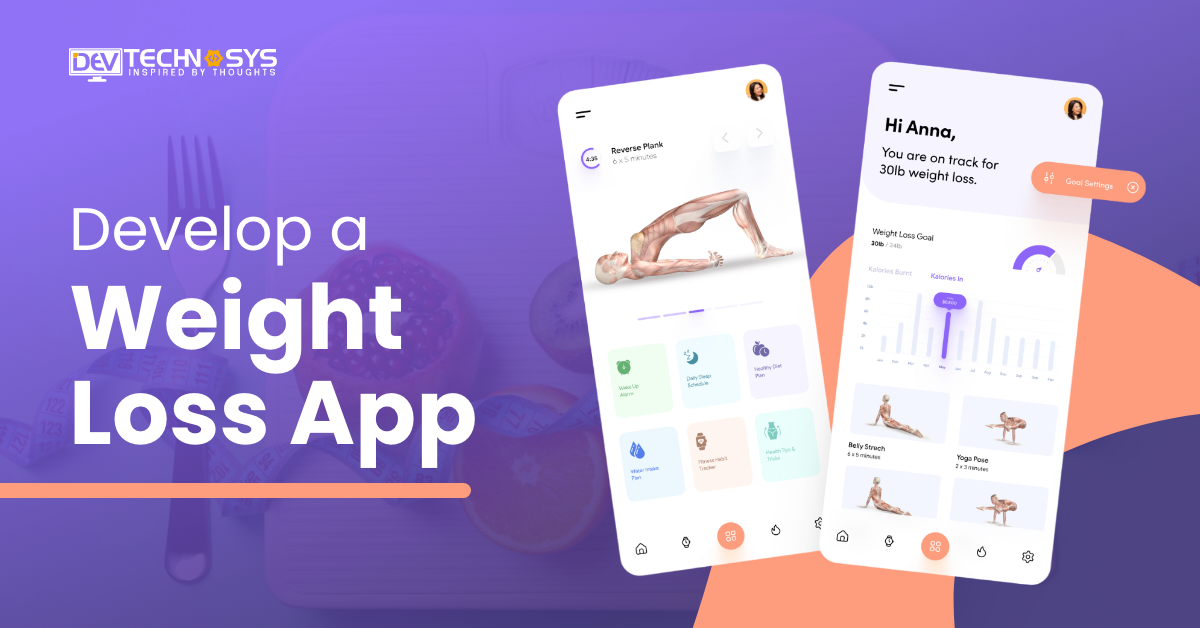Hey everyone!
It all started two years ago when I found out I had PCOS. As a previously healthy kid, gaining a ton of weight in just a month was a huge shock. That’s what sent me running to my gynaecologist, who dropped the bomb: the weight loss was crucial for managing my PCOS. And that’s how my weight loss journey began.
Here’s the thing: PCOS affects an estimated 8-13% of reproductive-aged women. Shocking, right? But it’s not just about PCOS. Overweight and obesity are a global issue, affecting almost 2.3 billion children and adults worldwide. These were the eye-opening stats I learned back in 2022, and they lit a fire under me.
So, I started with home workouts and a clean diet. But you know what made a huge difference? Weight loss apps. They’ve been such a helpful tool, and I’ve wanted to write about them for a long time.
Many people like me have gotten a lot of support from these Wighet loss apps. Now, I finally had the opportunity to share some incredible insights with you all!
This blog is for two types of people:
- Anyone who wants to develop a weight loss app or get information on weight loss apps should read on. I’m here to share everything I’ve learned about these apps, from features to functionality.
- Aspiring fitness and health app entrepreneurs: The market for weight loss and fitness apps is booming! Here, you’ll find real user experiences and expert-backed information to help you develop a weight loss app that stands out.
Everything I share here will be based on our professional experience and insights from trusted sources. So, dive on in, and let’s get started!
Quick Summary : This blog has everything you need to know from the process to develop a weight loss app, including cost, benefits, working, competitors, monetization and many more. So, let’s skip to the good part.
What is a Weight Loss App?
Weight loss apps are electronic devices made to help customers lose weight. Typically, they offer capabilities like food planning, exercise regimens, development monitoring, and calorie tracking.
By gamifying the weight loss procedure and providing aid and academic materials, these apps can inspire users. Working with a mobile app development company will allow you to give a weight reduction app that stands proud inside the aggressive health and wellness market and appeals to a particular area of interest.
How Does Weight Loss App Work?
Apps for weight reduction act as portable coaches. This is the way it works:
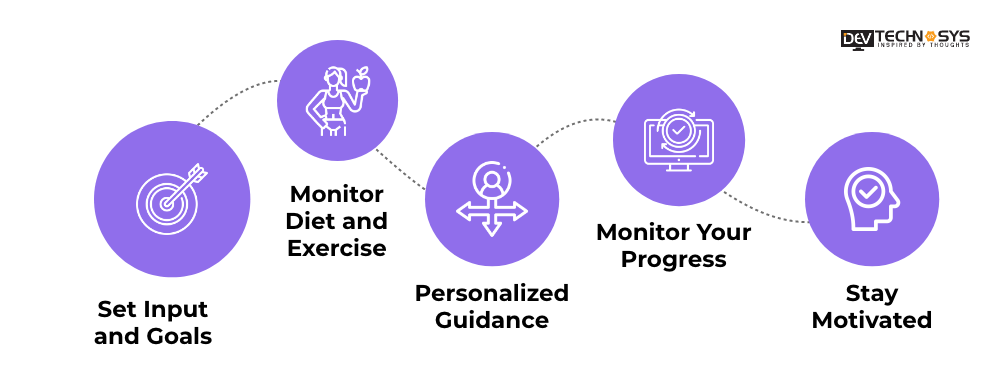
1. Set Input and Goals:
You enter your preferred weight loss quantity and offer details about your height, weight, and stage of exercise.
2. Monitor Diet and Exercise:
Record your sporting events and food (calories, macros). The weight loss encouragement app could study barcodes or use photographs.
3. Personalized Guidance:
The app for weight loss makes suggestions for meal-making plans, exercise regimens, or calorie targets based on your information.
4. Monitor Your Progress:
Use graphs and badges to maintain the tune of your measurements, weight, and accomplishments.
5. Stay Motivated:
Numerous apps provide instructional materials, network challenges, and inspirational charges to keep you interested.
Market Stats On the Fitness Industry
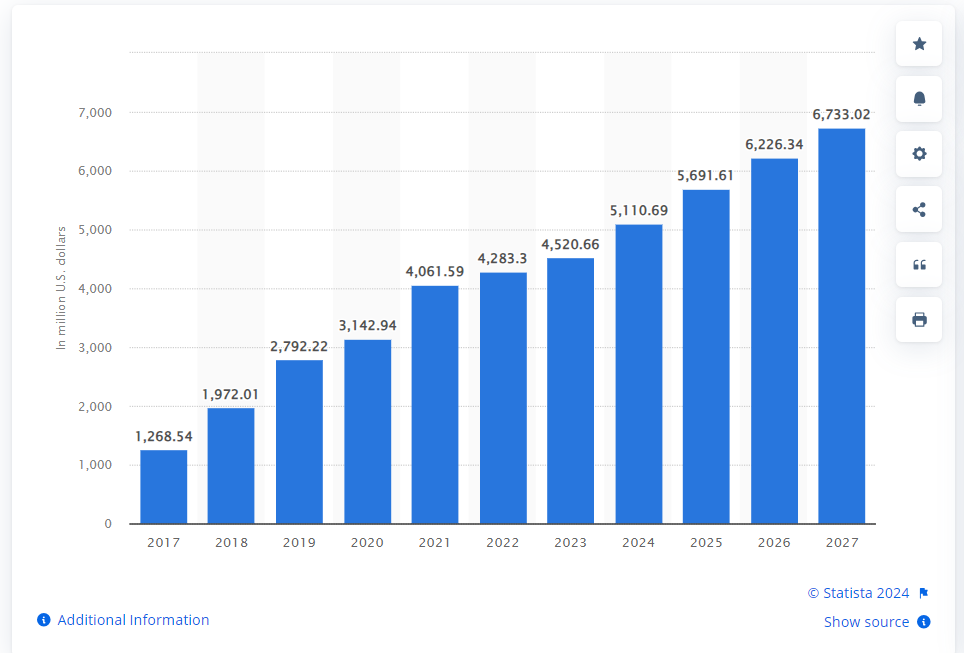
- It is expected that between 2024 and 2027, the app marketplace’s “Health and Fitness” segment’s global indicator, “Revenue By Segment,” could grow progressively with the aid of 6 billion U.S. Bucks.
- It is expected to reach7 billion US bucks, a new pinnacle in 2027, following the 11th year of will increase.
- Global income of nutrients apps is predicted to reach US$5.40 billion by 2024.
- The market is expected to reach a projected value of US$8.29billion by 2028, growing at a compound annual growth rate (CAGR) of 31% from 2024 to 2028.
- By 2028, the user penetration price is expected to attain 15%, up from an expected 4.40%in 2024.
- The average sales according to person (ARPU) could be USD 40.69.
- When compared globally, India is anticipated to supply the most significant revenue in the nutrition apps marketplace, reaching US$1,581,000,000 in 2024.
Dive into the Top 8 Weight Loss Apps: Your Guide to a Healthier You!
Before I take you on a journey to develop a weight loss app, why not dive into the market competitor research section first? The market for the best weight loss apps is increasing and offers a wide, wide variety of options to fulfill your goals.
These are the best weight loss apps that we have curated:
App Name |
Downloads |
Founders |
| Whisk | 10L+ | Nick Holzherr |
| Peloton | 10L+ | John Foley (CEO) |
| MyFitnessPal | 10Cr+ | Mike Lee & Luis von Ahn |
| Healthify | 1Cr+ | Sachin Bharat Pegu & Tushar Vashisht |
| Fitbit | 5Cr+ | James Park & Eric Friedman |
| Fitcoach | 1Cr+ | Frederick Debard & Damien Boudet |
| Google Fit | 10Cr+ | Google Development Team |
| Noom | 1Cr+ | Artem Petakov |
1. Whisk:
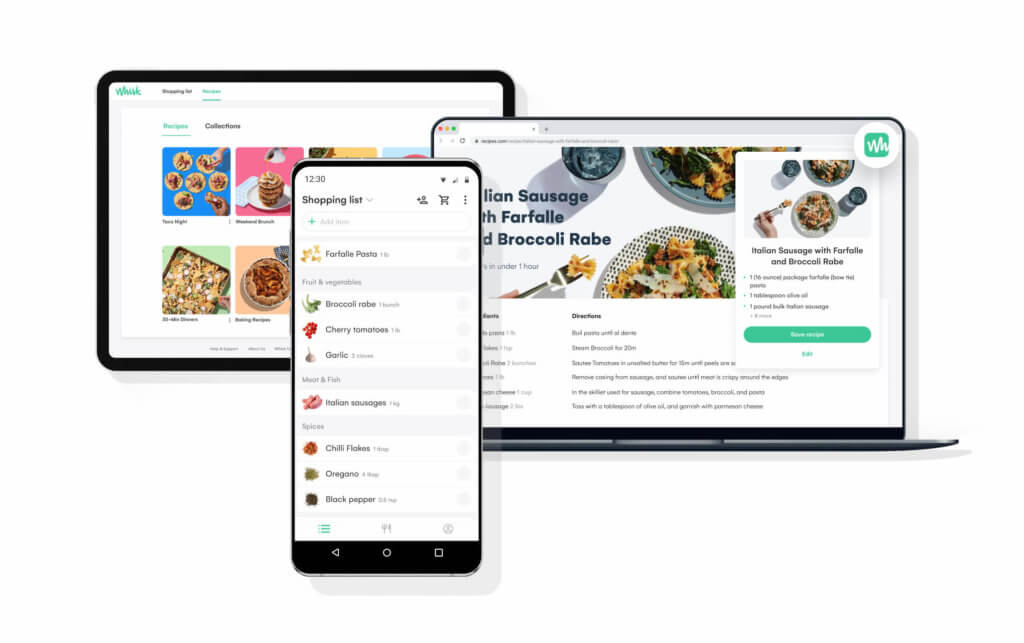
Personalized meal planning with dish hints based on nutritional necessities and tastes is the main emphasis of this 2012 startup, which increased the demand among investors to build an apps like Whisk.
2. Peloton:

Found in 2012, Peloton is famous for its interactive spin instructions and schooling regimens, which may be accessed via its stationary motorcycle app.
3. MyFitnessPal:
An industry veteran, MyFitnessPal was based in 2005 and has an extensive user base. It is especially appropriate for meal logging and complete calorie monitoring, which results in increasing the demand to build an apps like myfitness Pal.
4. Healthify:
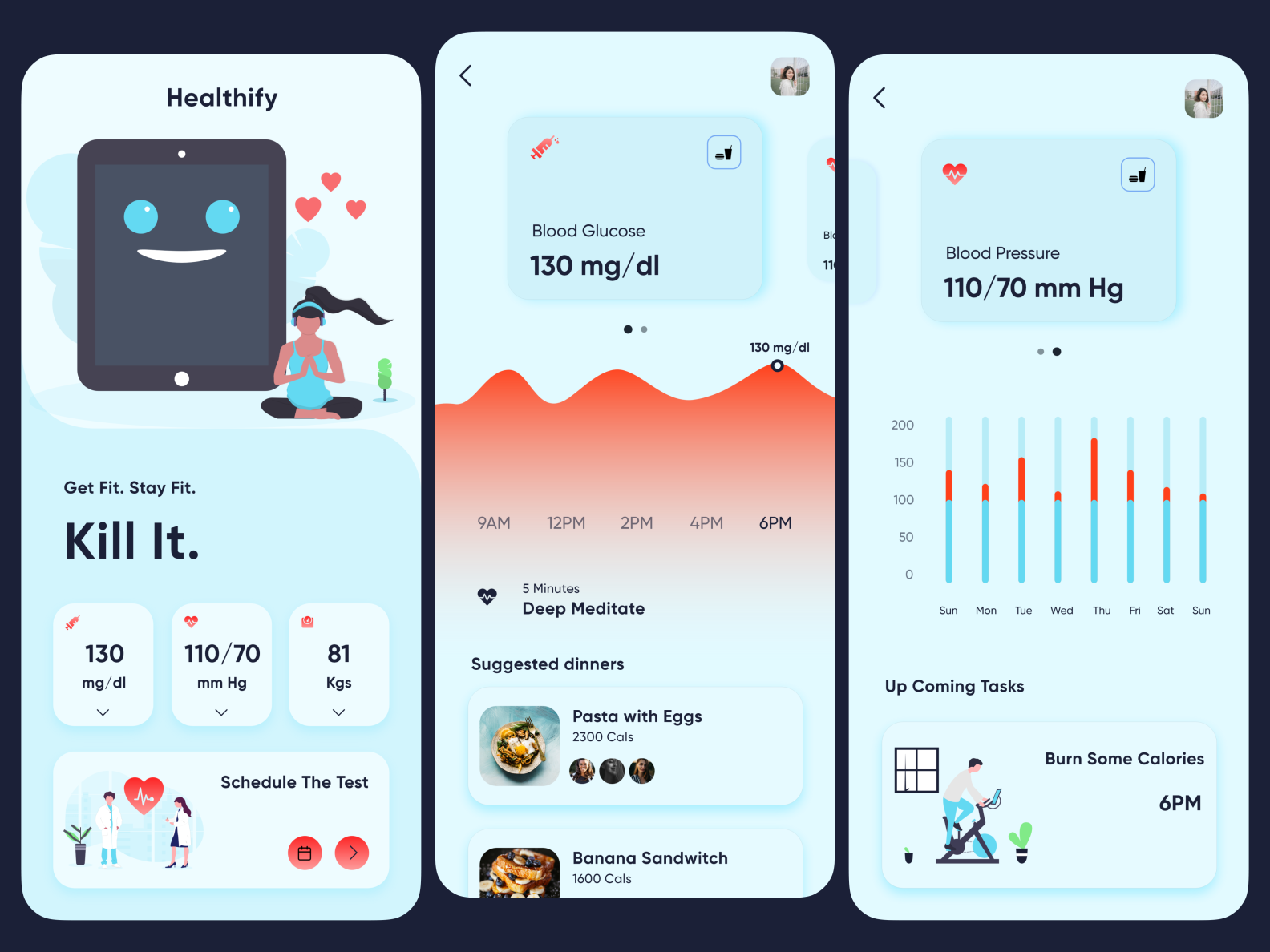
Established in 2013, Healthify offers a complete technique with tools such as workout regimens, calorie tracking, and direct connection to Indian-certified dietitians for individualized recommendations.
5. Fitbit:

Introduced in 2007, Fitbit offers tools for managing weight, tracking pastimes, and tracking sleep patterns. Its app like Fitbit, really works easily with its properly favored wearable devices.
6. Fitcoach:
Founded in 2014, Fitcoach provides tailor-made exercise plans—apps like Fitcoach steerage from certified running shoes to in shape various health degrees.
7. Google Fit:
Google Fit debuted in 2014 and is pre-installed on the majority of Android smartphones. This app like Google Fit, affords a simple-to-use interface for interest tracking and purpose-placing.
8. Noom:
Founded in 2007, Noom employs a psychology-based approach to assist long-term weight reduction by fusing coaching, instructional materials, and calorie tracking. It has increased the demand for building apps like noom.
Shedding Pounds and Pixels: 5 Steps to Develop a Weight Loss App
Nothing is hidden from you—not the demand, craze, need, or market for weight loss applications. Every entrepreneur knows how crazy it will be if they develop a successful weight loss app. So people…!
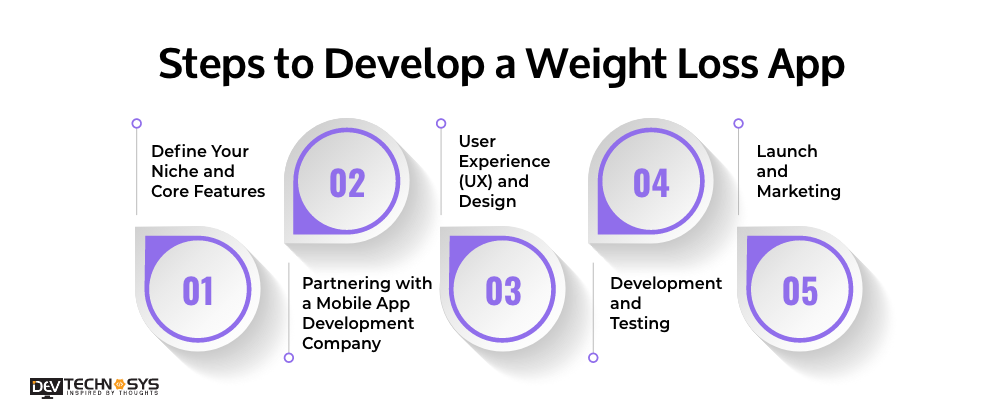
If you really want to develop a weight loss app with unique features and offer value to users, we have curated 5 step guide for you:
Step 1: Define Your Niche and Core Features
That is the first stage to develop a weight loss app in which you must keep in mind that every weight loss journey is precise. Determine who your target marketplace is: finances-aware humans, busy specialists, and so on. What makes your app particular?
Does it emphasize mindful eating, gamified demanding situations, or customized meal plans? List the essential capabilities that resolve consumer ache factors and attraction to your niche. Popular picks consist of:
- Calorie tracking and logging
- Meal planning and recipe integration
- Activity monitoring (steps, workouts)
- Progress tracking and goal-setting
- Educational content and motivational tips
Step 2: Partnering with a Mobile App Development Company
It is the second stage to develop a weight loss app. Design, coding, and feature integration expertise are necessary for growing an app. It’s crucial to hire a mobile app developers team.
Look for a weight loss app development company that has evolved a hit development strategies, a strong portfolio, and experience with the best fitness and weight loss apps. Transparency and communication are vital! Openly speak your dreams, spending plan, and agenda.
Step 3: User Experience (UX) and Design
This is the third stage to develop a weight loss app in which you should know initial impressions are something that keeps users engaging. The interface of your app has to be clear, easy to apply, and visually attractive.
It is crucial to keep in mind that user engagement demands smooth-to-use functions and easy navigation. To keep customers stimulated, think about the use of gamification features like progress bars or medals in the weight loss inspiration app.
Step 4: Development and Testing
This is the fourth and second last stage to develop a weight loss app, which is the core stage in which the mobile app development company will start the process and test it to launch. Collaborate intently together with your community app development company to guarantee that each feature operates without a hitch. Extensive trying out is critical.
It contains beta checking out with a small user base and internal trying carried out via the weight loss app development company. Obtain input, then make iterative changes to the functionality and design in light of their experiences.
Step 5: Launch and Marketing
Last but not least, the stage is to develop a weight loss app. Yes, it’s Time for the display! When the weight loss application is flawless and free of insects, app stores can launch it.
Collaborate with your weight loss app development company to design a thorough marketing plan.
To make sure your target market reveals your app, this can entail influencer marketing, social media campaigns, and app store optimization. It is vital to know that having mobile app maintenance services to assist you with the maintenance of your app after deployment will be a wiser choice.
“Working with Dev Technosys to develop our fitness app was an outstanding experience. Their team demonstrated exceptional expertise, delivering a user-friendly and robust weight-reducing app that exceeded our expectations. The seamless integration with wearable devices and intuitive design have greatly enhanced our user engagement. We highly recommend Dev Technosys for any mobile app development needs.”
Chris Thomas
Unique Features of Weight Loss App
Features |
Descriptions |
| Personalized Meal Plans | Custom meal plans based on dietary preferences, restrictions, and weight loss goals. |
| AI-Powered Exercise Suggestions | Exercise recommendations tailored to user fitness levels and progress using AI algorithms. |
| Progress Tracking | Track weight, measurements, and other health metrics over time with visual progress charts. |
| Social Support Community | In-app community for users to share their progress, challenges, and support each other. |
| Integrations with Wearables | Sync with fitness trackers, smartwatches, and other health devices for real-time data. |
| Calorie and Nutrient Database | Extensive database of foods with detailed nutritional information and calorie counts. |
| Motivational Notifications | Daily motivational quotes, reminders, and tips to keep users engaged and on track. |
| Custom Workouts | Personalized workout routines created by fitness experts, adaptable to various fitness levels. |
| Goal Setting and Achievements | Set weight loss and fitness goals with milestone achievements and rewards. |
| Recipe Library | A collection of healthy, easy-to-make recipes with step-by-step instructions and shopping lists. |
How Do Weigh Loss Apps Make Money?
Now that you have your diet and nutrition app development in hand, your mind must be focused on how you can get maximum ROI on the weight loss app development cost.
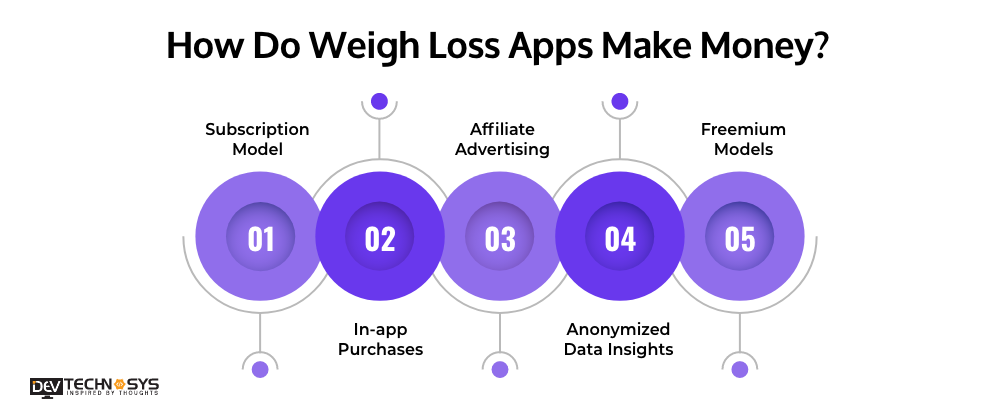
1. Subscription Model:
This method allows customers to access top-class functions for a monthly or annual rate, including superior workouts, personalized food regimen planning, and certain progress tracking.
2. In-app Purchases:
Weight loss application users may be charged a one-time fee to access extra capabilities like distinctive recipes, personalized training sessions with fitness instructors or nutritionists, or ad-free reports.
3. Affiliate Advertising:
On-demand app development solutions can sell precise goods or offerings that customers should purchase through incorporated hyperlinks and obtain commissions by partnering with fitness and wellbeing companies.
4. Anonymized Data Insights:
Specific apps may integrate and anonymize user records on dietary choices, workout regimens, and patterns of weight reduction. For marketing or study purposes, fitness and health groups may additionally locate costs in these anonymized records.
5. Freemium Models :
Allow on-demand app development to offer away a simple set of capabilities. Still, users need to pay for a top-rate membership to get entry to advanced capabilities or content. It can be a beneficial strategy to turn loose customers into paying clients by enabling them to test the app before committing.
Why Building a Weight Loss App Can Be a Smart Investment For Entrepreneurs?
Many of you may wonder if we know the process to develop a calorie counter app, but why should we invest in it? Don’t worry; we have everything covered for you here. Weight loss apps are a large player in the burgeoning health and wellness zone.
But why ought an entrepreneur such as you reflect on considering investing in developing your weight loss app whilst there are such a lot of options available? Here are five sturdy reasons:
1. A Lucrative Market with High Demand:
- By 2027, the weight loss business is predicted to generate an impressive $580.2 billion in revenue internationally.
- As thousands of people cope with weight control globally, there may be a consistent and robust desire for valuable tools.
- With the best advertising and marketing plan in the area, your weight loss app development solutions can reach a large audience and generate a large amount of revenue.
2. Potential For High ROI (Return on Investment):
- For the best calorie counter apps, various monetization techniques, such as partnerships, in-app purchases, and subscriptions, are available.
- Offering top-rate services like custom-designed weight loss app applications, sophisticated workout regimens, or ad-loose studies.
- It can permit you to get repeat business from dedicated customers.
- Partnerships with fitness and well being firms for product suggestions or fact insights can also be profitable sources of earnings.
3. Fostering User Loyalty and Engagement:
- Cutting weight apps do more than just song calories.
- You develop an on-demand fitness app like Peloton and help customers maintain their hobbies and commitment to their weight loss journey.
- The help of along with factors like conscious ingesting education, community challenges, and motivating hints.
- Increased retention costs from excessive user engagement bring about an extra worthwhile and long-lasting business approach.
4. Building a Scalable and Adaptable Business:
- The scalability of mobile app development is one of its most significant capabilities.
- You, the best weight loss app, can, without difficulty, take delivery of more users because it expands.
- Using modular design and cloud-based weight loss app development solutions allows you to, without problems, add new capabilities and functionalities to satisfy changing user needs.
- This flexibility guarantees that, within the dynamic weight loss market, your weight loss accountability app will continue to be aggressive and applicable.
5. Standing Out in a Crowded Market:
- If you want to create a mobile app for health and fitness, you must know that novel concepts are continuously welcomed, even in incredibly competitive markets.
- By targeting a particular area of interest, such as vegetarianism, weight loss for running specialists, or users in a decent price range, you may serve a dedicated user with unmet requirements.
How Can a No-code Solution Help?
In the process of developing a weight loss app, no-code solutions can be a recreation-changer, in particular for individuals with a clean concept, however little investment or coding enjoy. How to do it’s far as follows:
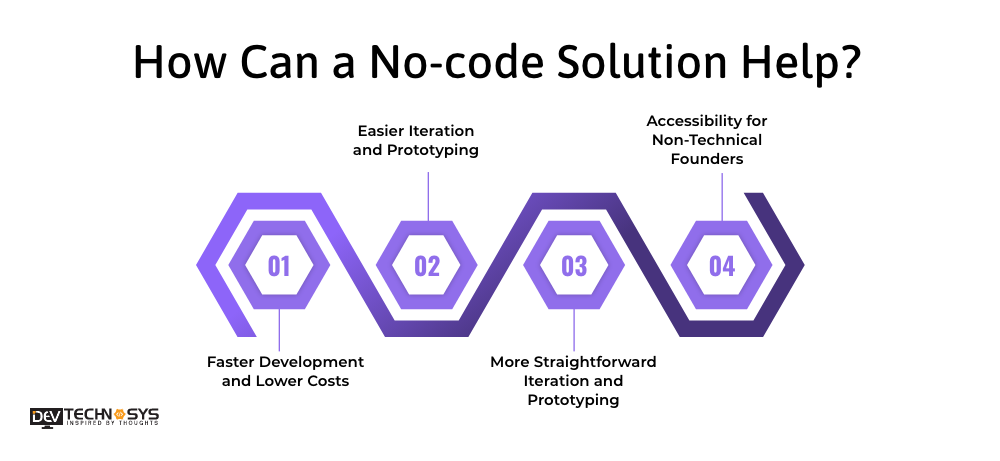
1. Faster Development and Lower Costs:
No-code systems facilitate drag-and-drop user interfaces and pre-constructed additives for capabilities like user profiles, development charts, and calorie tracking. This eliminates the necessity for complicated coding and saves time and diet and nutrition app development costs.
2. Easier Iteration and Prototyping:
No-code solutions can help you concentrate on your best apps for exercise and weight loss, which have essential functions that may consist of customized meal plans, one-of-a-kind demanding situations, or a vibrant network. This is because they streamline the development procedure.
3. More Straightforward Iteration and Prototyping:
Through the usage of no-code platforms, prototyping can be finished more hastily and with capable users. It allows you to fast iterate on your layout and capability prior to launching a full-fledged weight loss mobile app and collect feedback.
4. Accessibility for Non-Technical Founders:
Anyone with a notable weight loss idea can create a simple app without any programming experience thanks to no-code tool. This makes app creation more accessible and welcomes innovative ideas.
How Much Does It Cost to Develop A Weightloss App?
The fitness tracking app development cost may range significantly primarily based on a number of variables. Here’s a summary to help you get the picture of the cost to develop a weight loss app:
Factors Affecting The Cost To Develop A Weight Loss App:
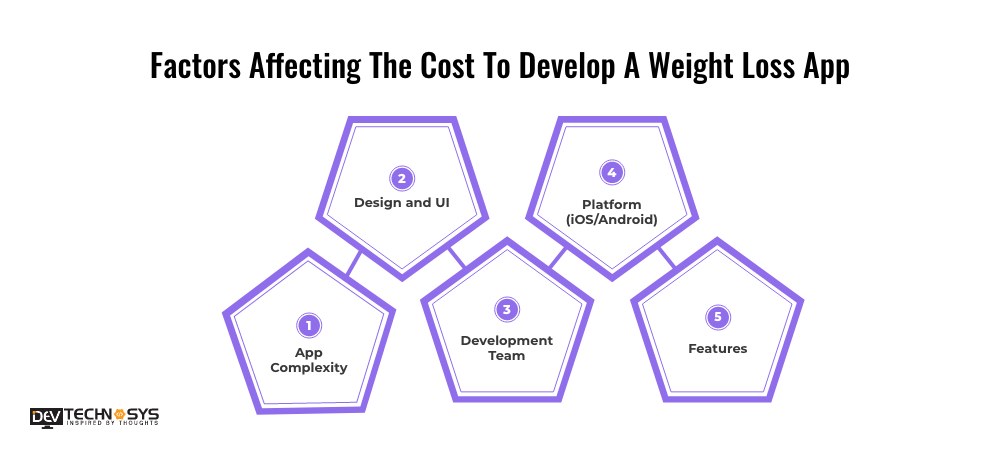
1. App Complexity:
The cost to develop a mobile app is affected by app complexity, which might be combined with complicated and feature capabilities like augmented fact integrations or personalized coaching.
2. Design and UI:
Compared to an easy interface, a polished and user-friendly design might increase the cost to develop a weight loss app.
3. Development Team:
Hiring a weight loss app development company business rather than hiring developers internally will reduce the weight loss app development cost.
4. Platform (iOS/Android):
It generally increases the cost and features to develop a fitness app depending on the choice of iOS and Android than for simply one.
5. Features:
The Time and weight loss app development costs are immediately impacted by the quantity and complexity of functions.
Calculated Price Ranges (Basic, Moderate, and Complex) in USD
App Complexity |
Cost Estimation |
| Simple Weightloss App Development | $8,000 to $15,000 |
| Average Weightloss App Development | $15,000 to $25,000 |
| Complex Weightloss App Development | $25,000 |
These are simplest approximations on cost to develop a weight loss app. Depending to your specific necessities, the real price of your app may be more excellent or lower. However it is advised you to connect with the leading fitness app development company if you want to get proper estimation depending on your needs.
Technology Stack Used In Weight Loss App
Layer |
Technologies |
|
Frontend |
React Native, Flutter, Swift (iOS), Kotlin (Android) |
|
Backend |
Node.js, Python (Django or Flask), Ruby on Rails |
|
Database |
MySQL, PostgreSQL, MongoDB |
|
Cloud Storage |
Amazon S3, Google Cloud Storage |
|
API Integration |
RESTful APIs, GraphQL |
|
Analytics |
Google Analytics, Firebase Analytics |
|
Payment Gateway |
Stripe, PayPal |
|
Push Notifications |
Firebase Cloud Messaging, Apple Push Notification Service (APNs) |
|
Security |
HTTPS, OAuth 2.0, JWT |
|
Deployment |
Docker, Kubernetes |
|
Monitoring |
New Relic, Datadog |
How Can Dev Technosys Assist You in Developing an App for Weight Loss?
We at Dev Technosys, a top fitness app development company, can work with you to create a weight loss app. Our areas of specialization include:
1. Personalized User Experience:
Develop a weight loss app with capabilities like customized weight loss plan regimens and exercise schedules to meet the desires of a wide range of users.
2. Engaging Design and UI:
Make an interface that is simple to use and evokes customers to return time and time once more.
3. Seamless Integration:
For a complete revel in, it contains key capabilities like hobby tracking, progress monitoring, and calorie tracking.
4. Scalable Development:
Create a weight loss app that can amplify to address new capabilities and growth in user base through the years.
Together, we will make a weight reduction app concept a fact. For a free session, get in contact with our weight loss app development services right now!
FAQ on Weightloss App Development
1. Why Should You Build A Weight Loss App?
Here are four crucial reasons to build a weight loss app:
- Growing Market: High demand for health and fitness solutions.
- User Engagement: Encourages consistent user interaction.
- Revenue Potential: Multiple monetization opportunities.
- Social Impact: Promotes healthier lifestyles.
2. How Much Does It Cost To Develop A Weight Loss App?
The cost to create a weight loss app varies from $8,000 to $25000, but it does depend on these factors.
- Factors: Features, design complexity, and fitness app development company location.
- Ongoing Costs: Maintenance, updates, and marketing.
- Budget Considerations: Start with an MVP to control initial expenses.
3. How Long Does It Take To Develop A Weight Loss App?
The time to build a weight loss app varies from 3 to 9 months depending on many factors:
- Phases: Planning, design, development, testing, and launch.
- Complexity Impact: More features and integrations extend timelines.
- Iterative Process: Continuous updates and improvements post-launch.
4. How To Monetize A Weight Loss App?
- Freemium Model: Free basic version with premium features.
- Subscriptions: Monthly or yearly plans for exclusive content.
- In-App Purchases: Diet plans, workout routines, and more.
- Advertisements: Partner with relevant brands for ads.
- Affiliate Marketing: Earn from promoting third-party products.
5. Why Choose Dev Technosys For Weight Loss App Development?
There are many reasons to choose our weight loss app development services, which we have covered below:
- Expertise: Specialized in health and fitness app development.
- Experience: Proven track record with successful projects.
- Customization: Tailored solutions to meet unique requirements.
- Support: Comprehensive post-launch maintenance and updates.
- Affordability: Competitive pricing without compromising quality.
6. What Challenges Might Arise During Weight Loss App Development?
- Feature Complexity: Balancing functionality and user-friendliness.
- Integration Issues: Ensuring smooth API and third-party service connections.
- Data Security: Protecting user information from breaches.
- Market Competition: Standing out in a crowded marketplace.
- Budget Management: Keeping development within financial limits.
